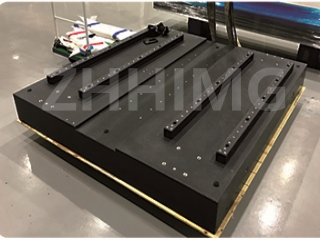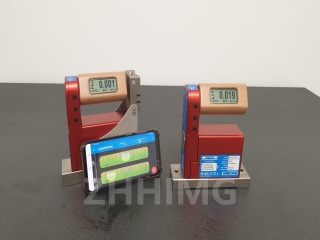The inspection of aero engine blades has extremely high requirements for the stability, accuracy and reliability of the platform. Compared with traditional inspection platforms such as cast iron and aluminum alloy, granite platforms show irreplaceable advantages in multiple key indicators.
I. Thermal Stability: A "Natural Shield" Against Temperature Interference
The coefficient of thermal expansion of cast iron platforms is approximately 10-12 ×10⁻⁶/℃, and that of aluminum alloys is as high as 23×10⁻⁶/℃. Under the heat generated by the operation of the detection equipment or fluctuations in environmental temperature, dimensional deformation is prone to occur, leading to detection errors. The coefficient of thermal expansion of the granite platform is only (4-8) ×10⁻⁶/℃. Within a temperature variation of ±5℃, the dimensional change of the 1-meter-long granite platform is less than 0.04μm, which can almost be ignored. This ultra-low thermal expansion characteristic provides a stable reference surface for precision equipment such as laser interferometers and three-coordinate measuring machines, avoiding measurement deviations of blade contours caused by thermal deformation.

Ii. Anti-vibration Performance: An "Efficient Barrier" for Eliminating Vibration Interference
In the aviation manufacturing workshop, the environmental vibration caused by the operation of machine tools and the movement of personnel is frequent. Aluminum alloy platforms have insufficient rigidity, and cast iron platforms have limited damping performance, making it difficult to effectively buffer vibrations. The dense crystal structure inside the granite platform endows it with excellent damping characteristics, with a damping ratio of 0.05-0.1, which is five times that of cast iron and ten times that of aluminum alloy. When external vibrations are transmitted to the platform, it can attenuate the vibration energy by more than 90% within 0.3 seconds, ensuring that the detection equipment can still output accurate data in a vibrating environment.
Iii. Rigidity and Wear Resistance: A "Solid Fortress" Ensuring Long-term Precision
After being used for a period of time, the cast iron platform is prone to fatigue cracks, which affects its accuracy. Aluminum alloy platforms have low hardness and poor wear resistance, making it difficult to withstand the frequent use of heavy-duty inspection equipment. The density of the granite platform reaches 2.6-2.8g /cm³, its compressive strength exceeds 200MPa, and its Mohs hardness is 6-7. When subjected to heavy loads and long-term friction from blade inspection equipment, it is not prone to wear or deformation. Data from a certain aviation enterprise shows that after continuous use for eight years, the flatness change of the granite platform is still controlled within ±0.1μm/m, while the cast iron platform needs to be recalibated after only three years.
Iv. Chemical Stability: The "Stable Cornerstone" for Adapting to Complex Environments
Chemical reagents such as cleaning agents and lubricants are often used in aviation inspection workshops. Aluminum alloy platforms are prone to corrosion, and cast iron platforms may also be affected in accuracy due to oxidation and rusting. Granite is mainly composed of minerals such as quartz and feldspar. It has stable chemical properties, a pH tolerance range of 1 to 14, and can resist the erosion of common chemical substances. There is no metal ion precipitation on its surface, ensuring a clean detection environment and avoiding measurement errors caused by chemical pollution.
V. Machining Accuracy: The "Ideal Base" for Precise measurement
Through ultra-precision technologies such as magnetorheological polishing and ion beam processing, granite platforms can achieve processing accuracy of ±0.1μm/m for flatness and Ra≤0.02μm for surface roughness, far exceeding that of cast iron platforms (±1μm/m for flatness) and aluminum alloy platforms (±2μm/m for flatness). This high-precision surface provides an accurate installation reference for high-precision sensors and measurement probes, facilitating the realization of three-dimensional contour measurement of aero-engine blades at the 0.1μm level.
In the high-demand scenarios of aero engine blade inspection, granite platforms, with their comprehensive advantages in thermal stability, vibration resistance, rigidity, chemical stability and processing accuracy, have become the best choice to ensure inspection accuracy and reliability, laying a solid foundation for the high-quality development of aviation manufacturing.
Post time: May-22-2025

